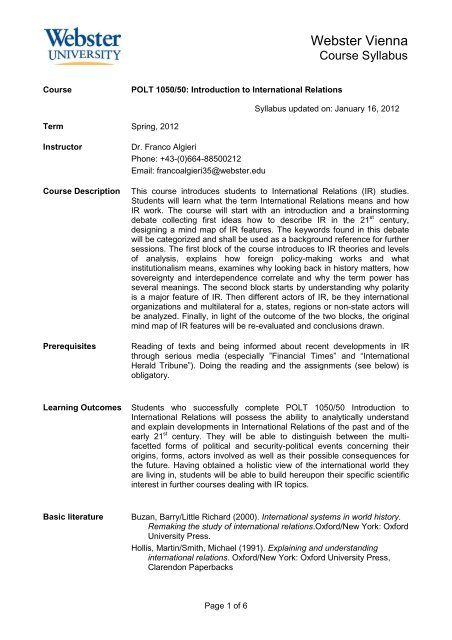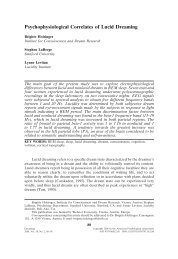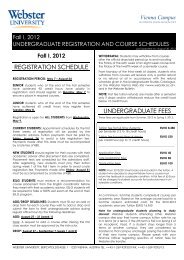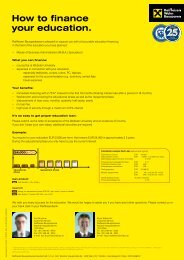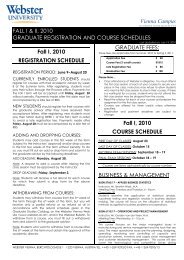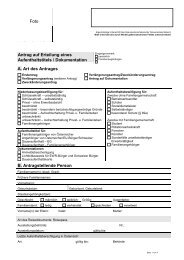Webster Vienna - Webster University Vienna
Webster Vienna - Webster University Vienna
Webster Vienna - Webster University Vienna
You also want an ePaper? Increase the reach of your titles
YUMPU automatically turns print PDFs into web optimized ePapers that Google loves.
Course POLT 1050/50: Introduction to International Relations<br />
Term Spring, 2012<br />
Instructor Dr. Franco Algieri<br />
Phone: +43-(0)664-88500212<br />
Email: francoalgieri35@webster.edu<br />
Page 1 of 6<br />
<strong>Webster</strong> <strong>Vienna</strong><br />
Course Syllabus<br />
Syllabus updated on: January 16, 2012<br />
Course Description This course introduces students to International Relations (IR) studies.<br />
Students will learn what the term International Relations means and how<br />
IR work. The course will start with an introduction and a brainstorming<br />
debate collecting first ideas how to describe IR in the 21 st century,<br />
designing a mind map of IR features. The keywords found in this debate<br />
will be categorized and shall be used as a background reference for further<br />
sessions. The first block of the course introduces to IR theories and levels<br />
of analysis, explains how foreign policy-making works and what<br />
institutionalism means, examines why looking back in history matters, how<br />
sovereignty and interdependence correlate and why the term power has<br />
several meanings. The second block starts by understanding why polarity<br />
is a major feature of IR. Then different actors of IR, be they international<br />
organizations and multilateral for a, states, regions or non-state actors will<br />
be analyzed. Finally, in light of the outcome of the two blocks, the original<br />
mind map of IR features will be re-evaluated and conclusions drawn.<br />
Prerequisites Reading of texts and being informed about recent developments in IR<br />
through serious media (especially ”Financial Times” and “International<br />
Herald Tribune”). Doing the reading and the assignments (see below) is<br />
obligatory.<br />
Learning Outcomes Students who successfully complete POLT 1050/50 Introduction to<br />
International Relations will possess the ability to analytically understand<br />
and explain developments in International Relations of the past and of the<br />
early 21 st century. They will be able to distinguish between the multifacetted<br />
forms of political and security-political events concerning their<br />
origins, forms, actors involved as well as their possible consequences for<br />
the future. Having obtained a holistic view of the international world they<br />
are living in, students will be able to build hereupon their specific scientific<br />
interest in further courses dealing with IR topics.<br />
Basic literature Buzan, Barry/Little Richard (2000). International systems in world history.<br />
Remaking the study of international relations.Oxford/New York: Oxford<br />
<strong>University</strong> Press.<br />
Hollis, Martin/Smith, Michael (1991). Explaining and understanding<br />
international relations. Oxford/New York: Oxford <strong>University</strong> Press,<br />
Clarendon Paperbacks
Additional articles of journals and book chapters will used (see below).<br />
Grading Grades will be based on a final paper, on the exams, on the participation in<br />
one group project and active contribution to discussions in class.<br />
Final Paper: 25%.<br />
Presentation of group project: 15%<br />
Exams: 50%.<br />
(Midterm: 25%, Final: 25%)<br />
Contribution to discussions and class participation: 10%<br />
<strong>University</strong> Policies Cheating<br />
Any student found cheating on any part of the course work (homework<br />
assignment, term paper, quiz, exam, etc.) will automatically be given an “F”<br />
for the course. Any student found to be helping another student to cheat<br />
will likewise be given an “F” for the course. In each case, the student will<br />
also be put on disciplinary probation for the remainder of her or his stay at<br />
<strong>Webster</strong>. If the student is found to have engaged in cheating a second<br />
time, s/he will be automatically expelled from the <strong>University</strong>.<br />
Attendance<br />
Class attendance is obligatory. Instructors are required to take attendance<br />
at each class session. If a student has two unexcused absences<br />
(equivalent to missing 4 hours for an 8-week course and 6 hours for a 15week<br />
course), the instructor will lower the student's grade by one letter<br />
grade and inform the student of the action. If a student has three<br />
unexcused absences (equivalent to missing 6 hours for an 8-week course<br />
and 9 hours for a 15 week course), the instructor will assign a grade of F<br />
and inform the student of the action.<br />
Class begins punctually. Instructors are entitled to penalize any late<br />
arrivals, which may affect a student’s final grade.<br />
NOTE: Students are required to inform themselves of WUV academic<br />
policies. A full list of these policies is available on the WUV website:<br />
(http://www.webster.ac.at/academics/academic-policies).<br />
Course Policies Class attendance is compulsory.<br />
Page 2 of 6
Weekly Schedule<br />
WEEK TOPIC ASSIGNMENT/ EXAMS<br />
Week 1 International Relations in the 21 st century:<br />
Introduction, first assessment and mind map of IR<br />
features<br />
Week 2 International Relations theory and levels of analysis<br />
Reading<br />
- Buzan/Little (2000), chapter 2.<br />
- Buzan/Little (2000), pp. 68-78.<br />
- Hollis/Smith (1991), chapter 1.<br />
Week 3 Foreign policy-making and institutionalism<br />
Reading<br />
- Hill, Christopher (2003). The changing politics of<br />
foreign policy. Houndmills/NewYork: Palgrave<br />
MacMillan, chapter 3.<br />
- Peters, B. Guy (1999). Institutional theory in social<br />
science. The ‘new institutionalism’. London:<br />
Continuum, chapter 9.<br />
Week 4 The importance of history: Learning from the past as<br />
a precondition to understand the presence<br />
Reading<br />
- Buzan/Little (2000), pp. 393-406.<br />
- Machiavelli, Niccolò. Short parts from Discourses<br />
on the First Decade of Titus Livius and The Prince.<br />
- Wohlforth, William C. et al. (2007): “Testing<br />
balance-of-power theory in world history”. In<br />
European Journal of International Relations 13(2),<br />
pp. 155-185.<br />
Week 5 Sovereignty and interdependence<br />
Reading<br />
- Keohane, Robert O./Nye, Joseph S. Jr. (1998).<br />
“Power and interdependence in the information age”.<br />
In: Foreign Affairs 77(5), pp. 81-94.<br />
- Krasner, Stephen D. (1999). Sovereignty.<br />
Organized hypocrisy. Princeton: Princeton <strong>University</strong><br />
Press, chapter 1.<br />
Page 3 of 6<br />
Assignments given and<br />
groups formed<br />
Reading and discussion<br />
Reading and discussion<br />
Reading and discussion<br />
Reading and discussion
- Werner, Wouter G./De Wilde, Jaap H. (2001). “The<br />
endurance of sovereignty”. In: European Journal of<br />
International Relations 7(3), pp. 283-313.<br />
Week 6 Forms of power: soft power, hard power, smart<br />
power<br />
Reading<br />
- Nye, Joseph S.jr. (2004). Soft power. The means to<br />
success in world politics. Cambridge MA, chapter 1<br />
- Waltz, Kenneth N. (1979). Theory of international<br />
politics. New York: MacGraw-Hill Inc., chapter 9.<br />
Week 7 A world of polarity: unipolar, bipolar, multipolar,<br />
nonpolar?<br />
Reading<br />
- Haass, Richard N. (2008). “The age of nonpolarity.<br />
What will follow U.S. dominance”. In: Foreign Affairs,<br />
May/June, pp. 44–56.<br />
- Krauthammer, Charles (1991). “The unipolar<br />
moment”. In: Foreign Affairs 70(1), pp. 23–33.<br />
- Krauthammer, Charles (2002/2003). “The unipolar<br />
moment revisited”. In: The National Interest, Winter,<br />
pp. 5–17.<br />
- Posen, Barry R. (2009). “Emerging multipolarity.<br />
Why should we care?” In: Current History,<br />
November, pp. 347-352<br />
Week 8 International institutions, multilateral fora,<br />
multilateralism, NGOs<br />
Reading<br />
- Calleo, David P. (2009). “How to govern a<br />
multipolar world”. In: Current History, November, pp.<br />
361-367.<br />
- Chayes, Abram/Handler Chayes, Antonia (1995).<br />
The new sovereignty. Compliance with international<br />
regulatory agreements. Cambridge: Harvard<br />
<strong>University</strong> Press, chapter 11.<br />
- Weiss, Thomas G. (2010). “Intensive care for the<br />
United Nations”. In: Current History, November, pp.<br />
322-328.<br />
Week 9 The United States of America: the only remaining<br />
superpower?<br />
Reading<br />
- Chivvis, Christopher S. (2010). “America. The<br />
Page 4 of 6<br />
Reading and discussion<br />
Reading and discussion<br />
Midterm exam<br />
Reading and discussion<br />
Group project due<br />
Reading and discussion
ambivalent leader”. In: Current History, November,<br />
pp. 336-341.<br />
- Kagan, Robert (2007). “End of dreams, return of<br />
history”. Hoover Institution, Policy Review No. 144,<br />
online.<br />
- Szabo, Stephen F. (2009). “The Washington<br />
bubble. Why US foreign policy is oversized”. In:<br />
Current History, November, pp. 368-373.<br />
Week 10 China: More than an emerging power – the next<br />
superpower?<br />
Reading<br />
- Dobbins, James et al. (2011). Conflict with China.<br />
Prospects, consequences, and strategies for<br />
deterrence. Rand Occasional Paper.<br />
- Shambaugh, David (2011). “Coping with a<br />
conflicted China”. In: The Washington Quarterly<br />
34(1), pp. 7-27.<br />
- Yang Jiemian (2010). “On the features of<br />
contemporary regrouping of international forces”. In:<br />
Global Review 5(2), pp. 9-23.<br />
Week 11 The European Union: a marginalized international<br />
actor or a superpower?<br />
Reading<br />
- Forsberg, Tuomas (2011). “Normative power<br />
Europe, once again. A conceptual analysis of an<br />
ideal type”. In: Journal of Common Market Studies<br />
49(6), pp. 1183-1204.<br />
- Grant, Charles (2009). Is Europe doomed to fail as<br />
a power?. London: Centre for European Reform.<br />
- Moravscik, Andrew (2010). “Europe the second<br />
superpower”. In Current History, March, pp. 91-98.<br />
Week 12 The Middle East: a region of concern?<br />
Reading<br />
- Hudson, Michael C. (2011). “The Middle East in<br />
flux”. In: Current History, December, pp. 364-369.<br />
- Ottaway, Marina (2010). “The rise and fall of<br />
political reform in the Arab world”. In: Current<br />
History, December, pp. 376-382.<br />
Week 13 Asia: the center of IR gravity in the 21 st century?<br />
Reading<br />
- Gill, Bates/Green, Michael J. (2009). “Unbundling<br />
Page 5 of 6<br />
Group project due<br />
Reading and discussion<br />
Group project due<br />
Reading and discussion<br />
Group project due<br />
Reading and discussion<br />
Group project due<br />
Reading and discussion
Asia’s new multilateralism”. In: Gill, Bates/Green,<br />
Michael J. (eds.). Asia’s new multilateralism. New<br />
York: Columbia <strong>University</strong> Press, pp. 1-29.<br />
- Kurlantzick, Joshua (2011). “The Asian century.<br />
Not quite yet?” In: Current History, January, pp. 26-<br />
31.<br />
- Reiterer, Michael. “Asia-Europe Meeting (ASEM).<br />
Fostering a multipolar world order through interregional<br />
cooperation”. In: Asia Europe Journal 7(1),<br />
pp. 179-196.<br />
Week 14 Russia: regional or re-emering global power?<br />
Reading<br />
- Kuchins, Andrew (2011). “Russia, the 360-degree<br />
regional power”. In: Current History, October, pp.<br />
266-271.<br />
- Trenin, Dimitri (2011). “Russia’s post-imperial<br />
condition”. In: Current History, October, pp. 272-276.<br />
Week 15 Evaluation and re-designing the mind map: outlook<br />
on international relations in the 21 st century<br />
Reading<br />
- Buzan/Little (2000), chapter 19.<br />
- Krasner, Stephen D. (2005). “The day after”. In:<br />
Foreign Policy, January 2005.<br />
- Serfaty, Simon (2011). “Moving into a post-Western<br />
world”. In The Washington Quarterly, Spring 2011,<br />
pp. 7-23.<br />
Page 6 of 6<br />
Final exam<br />
Reading and discussion<br />
Final paper due<br />
Reading and discussion


